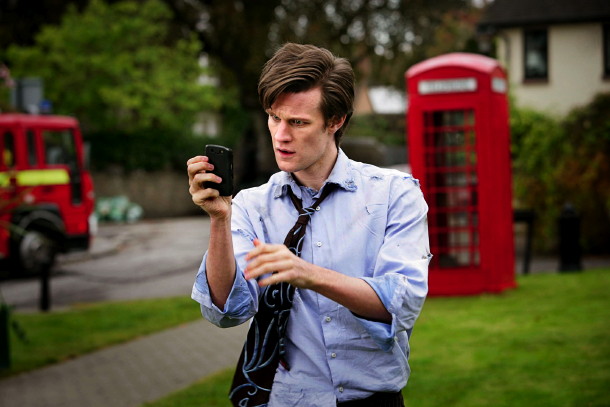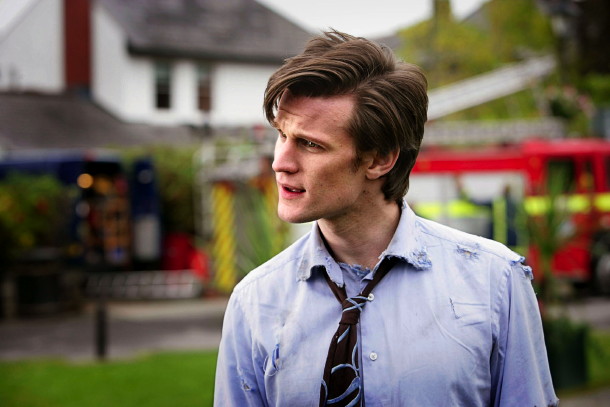Doctor Who Director Interview
None
We speak to Adam Smith, the man who called the shots on Matt Smith's debut as the Doctor

Adam Smith’s made music videos for the likes of the Chemical Brothers and the Streets (you can see a selection of his work here ), directed episodes of Skins and Little Dorrit and now he’s been given the colossal responsibility of shepherding the Eleventh Doctor through his first adventure – not to mention the two-part return of the Weeping Angels later in the series (for which he used his contacts book to invite the Streets’ Mike Skinner to film a small cameo). We phoned Smith up this morning to have a chat about his Who experience.
SFX: You’ve made numerous music videos, directed episodes of Skins and Little Dorrit , and now you’ve made three episodes of Who . You certainly like to be eclectic…
I guess I always look for the story really and if there’s a good story in there and – this sounds so pretentious! – it speaks to me personally and I feel I might have something I can do for it, then that's the main criteria. I read episode one of Doctor Who and it was just a brilliant script – I particularly fell in love with the first 20 minutes, which are this fairy tale of a little girl who’s basically meeting Father Christmas. The prospect of working with Matt was something that appealed as well, because having seen him on stage he was on my hitlist of actors that I wanted to work with one day.
SFX: You’re a newcomer to the Who- niverse. Were you asked to bring something radically different?
The brief was almost just to do the same but make it a bit different – the producers didn’t want it to be radically different, but they did want it to be different. They asked in the first interview how I would make it different, and I said that you just have to be true to the script and you shouldn’t do something just to make it different – you have to do what the script tells you to do, and if you study the script long enough the clues come out. But the big thing to do was make it feel more cinematic. So I looked at Tim Burton’s stuff, and also ET, because ET’s got that magic about it – magical was a key word that we talked about.
SFX: Coming on to a show like Doctor Who which has nearly 50 years of history, do you have to treat the episode like it’s the first ever, or are there certain rules you have to follow?
I was often asking Steven Moffat whether the TARDIS always has to do this, or has it always done this, and there were a few things like that, but generally I think you just have to treat the episode as its own story and its own character. You have to play with what’s on the page, and we really tried to find the human relationships and how they worked. I think you just have to go with the story that’s in front of you and what’s there on the page and under the page as well, studying it and digging deep for what’s going on and finding things out about Steven’s subconscious that he probably doesn’t want any of us to know!
Early on when I was rehearsing and talking with Matt we talked a lot about who the Doctor was. My real thing was to play the truth of the character, rather than it being so much about having to save the world – even in high-pressure situations in real life, you still have the relationships you normally have. Whatever the gravity of the situation, human relationships still prevail and in a way that’s what gives the audience an in to the show making characters human rather than superheroes. So for example with River Song [who returns in the Weeping Angels episodes] and the Doctor we really played on the idea of an old married couple – even though they’re trying to save the world, they’re still having petty bickers. We talked in rehearsals about it being a bit like mum and dad arguing over directions in the car, though actually River and the Doctor are trying to save themselves and the people they’re with.
SFX : Although “The Eleventh Hour” is the season opener, the Weeping Angels two-parter “The Time Of Angels” and “Flesh And Stone” was the first Matt Smith story filmed. Was it helpful to start off with familiar characters like River and the Angels?
Actually I think the pressure was really on because “Blink” is such a brilliant, brilliant, brilliant episode, and I was thinking, how are we going to make it as good as that? At the same time it was great because they’re such amazing, scary monsters, and such a brilliant invention. But they were an absolute nightmare to film with! They’re actual people under the prosthetics and getting real people to stand still in those poses, and the time it takes to get them ready, and then the schedule we had, and filming in a forest where the rain was coming down and people couldn’t walk because there was mud, and we were filming nights for two weeks… There were a few “solution opportunities” as Americans might say – and please put that in inverted commas. I’m not saying it seriously!
Sign up to the SFX Newsletter
Get sneak previews, exclusive competitions and details of special events each month!
SFX: You were shooting those first episodes under the gaze of the UK’s press, with paparazzi snappers everywhere. Was it a high pressure situation?
It was, but I just really tried to – as much as you can – shield Matt and Karen from that and keep them focused on what we were doing. Also, me and Matt kind of made a pact at the beginning that we’re not going to talk about previous Doctor Who s because we’d been employed to do a job – all we can do is the best version of it that we can do. I think if you start thinking, we need to start making it as good as that before… Obviously that’s in the back of your head but you can’t let that thought get through because it would waste a lot of energy and end up destroying you.
You sometimes forget what a huge thing it is – but at the same time it's really lovely. We were filming some scenes in a house with a school next door and Matt went across and sort of met the kids who were leaning over the fence, and it was just this brilliant thing where you realise this programme just gives people so much joy and so much excitement, and you think, isn’t it lovely and brilliant to be working on such a thing, I really hope we can pull it off!
SFX: You get the sense watching Matt that every take might be different. Is that the case?
Yeah, he wants it to be spontaneous and in the moment, rather than being premeditated and technical – although necessity means some of the stuff has to be like that, and that’s something he really grew in to. We tried to just keep a spontaneity going. Often I’d have the take I wanted and then, to the fury of the crew, say, let’s have another one – you do what you want. It wasn’t popular with the crew but very popular with Matt, who’d give you something different. Certainly not popular with the editor either, because of continuity sometimes, but I’d rather have brilliant performances than be worrying about continuity.
SFX: Were those last takes often the ones you ended up using?
It really varied. Matt really got off on reacting to other people. He was great with Caitlin who played little Amelia [the little girl in the opening episode] and often I’d give a note to the other actor rather than to Matt – I told Olivia Colman to really tease and wind him up, and he’d react to that in the moment. You’d get wonderful, spontaneous, very real feeling stuff when the actors did things he wasn’t expecting, and vice versa. That way it kind of keeps it fresh and spontaneous.
SFX : It’s clear in the first episode that Matt and Karen have fantastic on-screen chemistry. Did you do anything to help that develop?
They get on brilliantly, but right at the start before we were doing episodes four and five, when we were rehearsing, I said that Matt and Karen needed to have an adventure together. There was a thing in the Cardiff bay where you go on a boat and it’s a real white knuckle ride and I just said, look, the two of you should go on that just to experience something really exciting where you’re just laughing and screaming together, just to have that feeling. So they went and did that and I think Karen enjoyed it more than Matt!

Richard is a freelancer journalist and editor, and was once a physicist. Rich is the former editor of SFX Magazine, but has since gone freelance, writing for websites and publications including GamesRadar+, SFX, Total Film, and more. He also co-hosts the podcast, Robby the Robot's Waiting, which is focused on sci-fi and fantasy.


